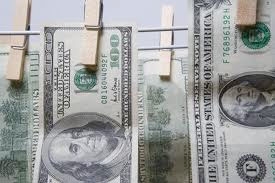Vietnam to fight flows of dirty money
 The draft Law on Anti-Money Laundering now under discussion at the 13th National Assembly’s ongoing second session aims to boost the health of Vietnam’s financial market. Designed using international know-how, the five-chapter, 53-article draft law would replace Decree 74/2005/ND-CP on anti-money laundering.
The draft Law on Anti-Money Laundering now under discussion at the 13th National Assembly’s ongoing second session aims to boost the health of Vietnam’s financial market. Designed using international know-how, the five-chapter, 53-article draft law would replace Decree 74/2005/ND-CP on anti-money laundering.
The document outlines a swathe of anti-money laundering measures for sectors including banking, securities, property and finance. The draft law also sets out clear responsibilities on anti-money laundering for state-owned agencies such as people’s procuracies and peoples’ courts at all levels.
The responsibilities of the State Bank, the Ministry of Public Security and many other ministries, ministry-level agencies and municipal and provincial people’s committees are also spelled out in detail. In addition, the draft law includes regulations dealing with international cooperation in anti-money laundering, and on combating the financing of terrorism.
The State Bank governor Nguyen Van Binh highlighted why such a law needed to be issued at the end of 2012. He said since joining the World Trade Organization in 2007, Vietnam had received a large volume of foreign direct and indirect investment and the country’s financial market was now more closely integrated into the world economy.
He warned, however, that Vietnam’s current legal framework on anti-money laundering was inadequate and could turn the country into haven where international criminals spent money illegally via a weak financial system.
Moreover, under Vietnam’s Law on Anti-corruption, many state officials and cadres must declare their assets and incomes. This means that they could find ways to legitimise ill-gotten gains.
A government report on the draft law also showed Decree 74 on anti-money laundering issued in 2005 had failed to help the country meet international standards on anti-money laundering.
For example, the decree does not task the State Bank’s Money Laundering Prevention and Combating Department to exchange information with foreign organisations as per international practices.
At the same time, the decree doesn’t outline the responsibilities of trust companies, notaries and accountants when it comes to the fight against money laundering. The same report said terrorism activities were threatening the economic and political security of every nation.
Vietnam became an official member of the United Nations Convention on Anti-Financing of Terrorism in 2002. Thus the law would help the country further comply with this convention, the report said.
In 2007, Vietnam became an official member of the Asia-Pacific Group (APG) on anti-money laundering. As a member, Vietnam must enforce 40 recommendations on anti-money laundering, and nine special recommendations on anti-financing of terrorism.
Nguyen Van Giau, chairman of the National Assembly’s Economic Committee, said: “The draft law must express clear opinions to ensure national financial security and national benefit. It must also ensure the normal production and business of enterprises, organisations and individuals in Vietnam.”
“The law must also include specific punishments for violators,” Giau said.
What the stars mean:
★ Poor ★ ★ Promising ★★★ Good ★★★★ Very good ★★★★★ Exceptional
 Tag:
Tag:
Related Contents
Latest News
More News
- New rules ease foreign access to Vietnam equities (February 05, 2026 | 17:29)
- 0.1 per cent tax proposed on each transfer of digital assets (February 05, 2026 | 17:27)
- Ministry of Finance tightens policy delivery at start of year (February 05, 2026 | 17:26)
- Vietnam steps up market reforms as FTSE Russell reviews upgrade progress (February 05, 2026 | 17:20)
- 2025 profits mixed amid strong energy and farming results (February 05, 2026 | 17:18)
- Cashless payments hit 28 times GDP in 2025 (February 04, 2026 | 18:09)
- SSIAM and DBJ launch Japan Vietnam Capital Fund (February 04, 2026 | 15:57)
- Banks target stronger profits, credit growth in 2026 (February 04, 2026 | 15:43)
- Vietnam on path to investment-grade rating (February 03, 2026 | 13:07)
- Consumer finance sector posts sharp profit growth (February 03, 2026 | 13:05)



















 Mobile Version
Mobile Version